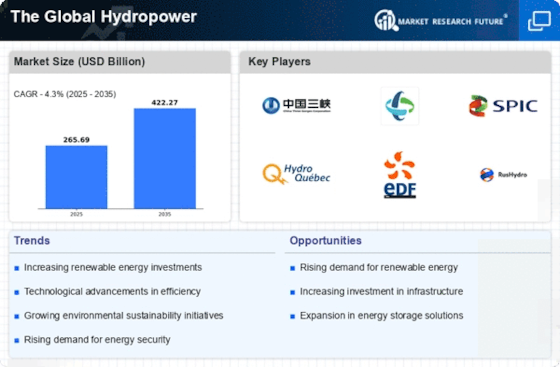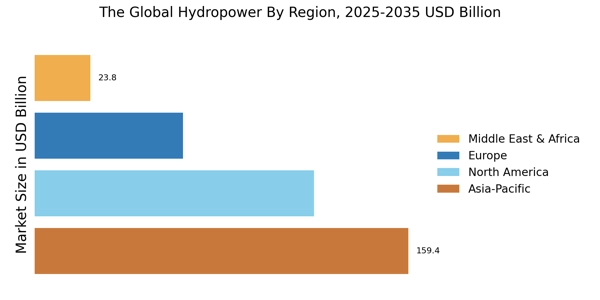Increasing Energy Demand
The rising The Global Hydropower Market. As populations grow and economies expand, the need for sustainable and reliable energy sources intensifies. In 2023, the energy consumption worldwide reached approximately 600 exajoules, with hydropower contributing around 16% of the total electricity generation. This trend is expected to continue, as countries seek to diversify their energy portfolios and reduce reliance on fossil fuels. The Global Hydropower Industry is likely to benefit from this increasing demand, as hydropower offers a renewable solution that can be scaled to meet the needs of both urban and rural areas. Furthermore, the integration of hydropower into national grids enhances energy security, making it an attractive option for governments and investors alike.
Technological Innovations
Technological innovations are reshaping the landscape of the hydropower market. Advances in turbine design, energy storage solutions, and digital monitoring systems are enhancing the efficiency and reliability of hydropower plants. In 2023, the implementation of smart grid technologies has allowed for better integration of hydropower into existing energy systems, optimizing performance and reducing operational costs. The Global Hydropower Industry is likely to experience growth as these innovations facilitate the development of more efficient and flexible hydropower solutions. Furthermore, the adoption of small-scale and run-of-river hydropower projects is becoming increasingly feasible, allowing for localized energy generation that meets specific community needs while minimizing environmental impact.
Investment in Infrastructure
Investment in hydropower infrastructure is crucial for the growth of the hydropower market. Governments and private entities are increasingly recognizing the importance of modernizing existing facilities and constructing new plants. In 2023, global investments in renewable energy reached over 500 billion USD, with hydropower accounting for a significant share. This influx of capital is directed towards enhancing efficiency, improving technology, and expanding capacity. The Global Hydropower Industry stands to gain from these investments, as they not only facilitate the development of new projects but also ensure the longevity and reliability of existing ones. Enhanced infrastructure can lead to increased generation capacity, thereby meeting the rising energy demands and contributing to a more sustainable energy future.
Climate Change Mitigation Efforts
The urgency of climate change mitigation is a driving force behind the hydropower market. As nations commit to reducing greenhouse gas emissions, hydropower emerges as a viable solution due to its low carbon footprint. In 2023, hydropower prevented the emission of approximately 4 billion tons of CO2, highlighting its role in combating climate change. The Global Hydropower Industry is positioned to play a significant role in achieving international climate goals, such as those outlined in the Paris Agreement. By investing in hydropower projects, countries can not only meet their energy needs but also contribute to global efforts to limit temperature rise. This dual benefit enhances the attractiveness of hydropower as a key player in the transition to a low-carbon economy.
Government Policies and Incentives
Government policies and incentives play a crucial role in shaping the hydropower market. Many countries are implementing favorable regulations and financial incentives to promote renewable energy sources, including hydropower. In 2023, several nations introduced tax credits and subsidies aimed at encouraging investment in renewable energy projects. The Global Hydropower Industry benefits from these supportive policies, as they lower the financial barriers for developers and investors. Additionally, regulatory frameworks that streamline the permitting process for hydropower projects can accelerate development timelines. As governments continue to prioritize renewable energy in their energy strategies, the hydropower sector is likely to see sustained growth and increased investment.

















